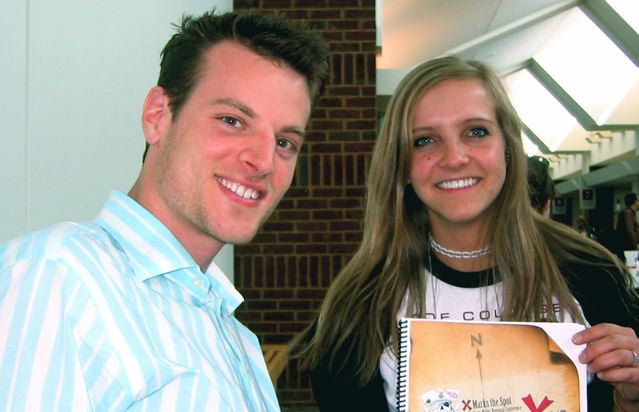Posted by Kevin Prentiss – Swift Kick
I’m sitting in a hallway at the NACA Northern Plains conference talking with Katie Mraz**, who is student Activities Chair for Homecoming at Coe College, in Cedar Rapids, IA.
Katie was in our Advisor Technology Round Up Ed Session this morning and had strong feelings. She said she “Wouldn’t be comfortable with professors or advisors messaging her through Facebook” and then afterward she said that, through the session conversation, she felt like she wanted to clarify.
The best thing about these conferences, the thing that technology will never replace, is the sit down conversation to really understand someone and their thoughts. Katie is a thinker and articulate. She’s one of the students that can really dig into an issue. She had reflected more on her first comment and wanted to dig in. I was excited to hear it.
I asked her if she would be willing to discuss the matter and let me blog about it because this issue – whether staff belongs on Facebook or not and how they should act – is a big discussion across the country. Any advice she could give would be invaluable. She agreed, pulled up a chair, and we took this picture:

To the discussion . . .
We started with her clarification:
“I’m uncomfortable with the social aspect [of Facebook] being breached with attempts at professional conversations. . . I don’t think Facebook should be used for formal messages. That’s not something I’m comfortable with . . . yet.”
The “yet” seemed to be an undercurrent of our conversation, Katie had this feeling that technological “progress” was inevitable. She kept qualifying her statements with “I might be the only one” or “maybe I’m old fashioned. . .” She had a sense of futility – that she was alone trying to hold the line against insurmountable odds.
I love the students who are willing to stand up for themselves.
Katie made clear distinctions between her advisors and professors. Professors were more clearly in Katie’s “business” category and she was more hesitant with them on Facebook. Like technological progress in general though, she was resigned with that as well:
“I get that professors are going to eventually use Facebook, it’s a tool they are going to use. I accept that, though I don’t know of any professors who are on it now.”
“If they care . . “
She was more open to advisors though. “It’s good for advisors to see who we interact with, it’s good for them to know what’s happening with me if they care.”
I love the distinction she is making here and think it is critical. In her words:
“Advisors decide how much more they care to know about their students. If they get on Facebook, they will see more about students than they would get to know on a normal basis. Then they have to decide if they want to care about that extra or not.
The advisors that I’m connected to on Facebook are the cool ones. They are the ones I want to be friends with, they are the ones that care. “Cool” is defined by the ones that really want to get to know the students, who are here for the students.”
It’s the words “cool” and “care” that I think are so confusing for advisors. (Let’s start by saying it’s certainly NOT the “care” that lawyers use in liability fear-flag terms like “duty of care.” Katie does not want or need advisors to take responsibility for her.)
In the conversation, this is where the rich experience of sitting across from someone comes into play. When Katie is explaining “cool” and “care”, she softens up, it’s all in the eyebrows (So much connotative meaning is lost with fast paced tech communication.) She means sincere interest, empathy and understanding (opposed to judgment). She means, simply, friends.
“I compartmentalize my communication. I check e-mail first, then I check Facebook. my e-mail is professional, that’s where my advisor talks to me about the NACA presentation, partially because of attachments. Then when I get on Facebook I’m looking for whose birthday it is and what is happening this weekend.
I’m comfortable with professors or staff being on Facebook, but I will not be on my most professional in communication with them. I will be “LOL”-ing . . I wouldn’t be comfortable IMing either – if their expectation was professional.”
Katie’s first concern is the relationship. Like most of us, she compartmentalizes her communication and strives to relate appropriately in a variety of contexts. This is an emotionally intelligent and efficient system.
She’s right, I think, to protect her own system by saying she’s not comfortable with professional relationships through Facebook. But she is NOT saying to professionals to stay off of Facebook. She is saying cool is good. Cool means you care. If you care enough to be friends with me show up on Facebook and it’s up to you to handle yourself as a “friend”.
I know not every advisor wants to be a friend. I can just hear someone arguing the goal of education should not be to be “cool”.
Right. Be authoritarian and lame, then try to influence at the college level. Try to dodge “care” and insist on not learning anything new yourself. Good luck.
I’m going to hang out with Katie on Facebook. We have lots more teach each other.
